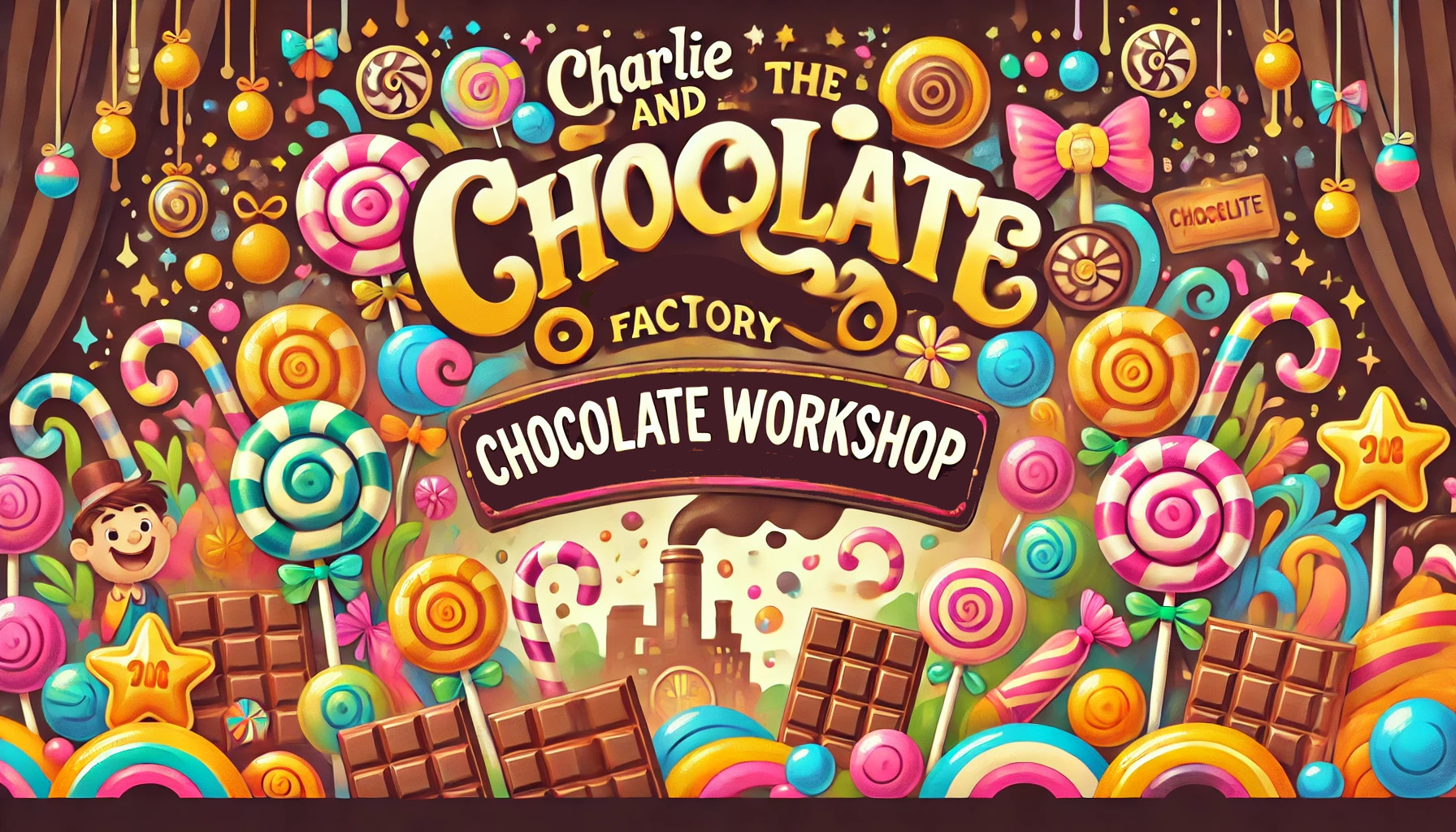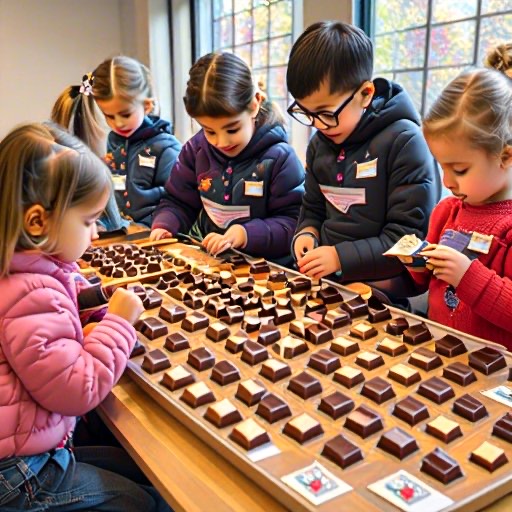 International Book Day is just around the corner, (6th March) and for many schools, it’s a wonderful excuse to celebrate the magic of reading through themed dress-up weeks, book-themed activities, and of course, the much-loved tradition of encouraging children to pick up a good book. Among the long list of books that have stood the test of time in the classroom, one that frequently tops the must-read list is Charlie and the Chocolate Factory by Roald Dahl.
International Book Day is just around the corner, (6th March) and for many schools, it’s a wonderful excuse to celebrate the magic of reading through themed dress-up weeks, book-themed activities, and of course, the much-loved tradition of encouraging children to pick up a good book. Among the long list of books that have stood the test of time in the classroom, one that frequently tops the must-read list is Charlie and the Chocolate Factory by Roald Dahl.
Originally published in 1964, Charlie and the Chocolate Factory has become an iconic part of children's literature, with its rich storytelling, memorable characters, and unforgettable setting. For generations, it has ignited imaginations, sparked creativity, and often been the first real introduction children have to the magic of reading. The story of Charlie Bucket and his adventure through Willy Wonka’s extraordinary chocolate factory continues to captivate young minds all over the world, making it a popular choice for International Book Day celebrations in schools everywhere.
Why is Charlie and the Chocolate Factory Still Relevant?
Timeless Appeal
There’s something about Charlie and the Chocolate Factory that resonates with readers of all ages, making it a book that endures through time. At its core, the novel is about the power of dreams, the importance of family, and the consequences of greed. The narrative weaves a magical tale that blends fantasy with moral lessons, ensuring that children come away from the story both entertained and enlightened. It also delves into themes like social inequality, with Charlie’s humble background contrasting sharply with the wealth and excess of the other children who visit the factory.
For International Book Day, these themes are not just an enjoyable read but also an opportunity to open discussions in classrooms about values, ethics, and the world around us. The characters—each with their quirks and flaws—offer ample opportunity for young readers to analyse and reflect on human nature, while also providing a bit of dark humour, which is one of Roald Dahl’s trademarks.
Dahl’s Mastery of Imagination
Dahl’s ability to create a completely fantastical world with memorable characters (like the eccentric Willy Wonka himself) and bizarre, yet captivating, situations makes Charlie and the Chocolate Factory perfect for sparking the imagination of young readers. The way Dahl describes the chocolate factory is nothing short of magical, encouraging children to picture the fantastical candy-making machines, the Oompa-Loompas, and the outrageous sweets that defy logic. For children who are still developing their love for books, this type of imaginative world-building encourages them to step into a realm where anything is possible.
On International Book Day, schools often dress up as their favourite characters, and what better way to bring these vibrant personalities to life than by donning a golden ticket, a Willy Wonka hat, or perhaps even a cheeky Oompa-Loompa costume? These playful costumes allow students to physically embody the story’s characters and deepen their connection with the book.

A Classic for Classroom Discussions
For decades, Charlie and the Chocolate Factory has been a staple of the school curriculum. It’s not just a fun story—it’s a tool for learning. The book is rich with discussion opportunities, from its vivid exploration of greed and self-control, to the idea of fairness in a world where some children seem to have everything, while others, like Charlie, have so little.
Teachers use it as a way to talk about the importance of humility, kindness, and gratitude. The story can also spark fascinating conversations around the notion of privilege and how some people, like the spoiled children in the story, are often given more than they deserve, while others, like Charlie, have to work harder for their dreams. The larger-than-life characters also help children see that their actions have consequences—a valuable lesson at any age.
A Boost to Literacy
With its captivating narrative, Charlie and the Chocolate Factory is a brilliant resource for enhancing literacy skills. The language is both accessible to young readers yet challenging enough to build vocabulary and comprehension. Additionally, Dahl’s wit and playfulness with language, including his invented words like "snozzcumbers" and "gloriumptious," make learning new words an enjoyable experience for children.
Many schools use the book to explore different styles of writing, examining Dahl’s use of description, dialogue, and pacing to create tension and excitement. As part of International Book Day activities, students might be encouraged to write their own stories set in a chocolate factory, or create their own creations, developing both creative and writing skills.
International Book Day Celebrations: Bringing the Magic of Charlie and the Chocolate Factory to Life
The magic of Charlie and the Chocolate Factory to Life extends beyond the pages of the book. On International Book Day, it’s a chance for schools to immerse themselves in the world of Willy Wonka, with fun dress-up days, themed activities, and plenty of sweet treats (hopefully not too many!). It’s a time when teachers and students alike can celebrate the joy of reading together, and Charlie and the Chocolate Factory to Life remains one of the best books for doing just that.
For me, International Book Day is extra special. As a chocolate consultant and chocolatier, I’m often very busy that week running chocolate workshops that reinforce the themes of the book, tying in the delicious world of Willy Wonka with hands-on, creative experiences. It’s an amazing way to bring the story to life and get students excited not only about reading but also about the art and science of chocolate-making. Through these workshops, children get to engage with the curriculum in a whole new way—transforming the lesson into an interactive, flavourful adventure!
Whether it’s designing their own chocolate bars, writing letters to Willy Wonka, or creating their own versions of the famous Golden Ticket, there’s no shortage of ways to get creative and keep the magic alive. For teachers, it’s a chance to inspire students to read more, think deeply, and perhaps even discover a new love for Roald Dahl’s wider body of work.
The Everlasting Magic of Charlie Bucket’s Adventure
As International Book Day continues to grow in popularity, Charlie and the Chocolate Factory to Liferemains an essential part of the celebration. Its whimsy, moral lessons, and timeless charm make it an ideal choice for young readers everywhere. Whether you’re dressing up as Willy Wonka, plotting your own chocolate factory adventure, or simply enjoying a good book, there’s no better way to celebrate the magic of reading than by diving into the world of Charlie and the Chocolate Factory to Life
Roald Dahl’s masterpiece isn’t just a story—it’s a journey of imagination, laughter, and learning that will remain on the must-read list for schools for years to come. So, grab your golden ticket and join in the fun—because the factory gates are open, and there’s always room for one more reader!
#PrimarySchoolTeachers #ClassroomReads #TeachingWithBooks #RoaldDahlForKids
#InternationalBookDay #CharlieAndTheChocolateFactory #BookDayInTheClassroom
#CreativeTeaching #LiteracyInTheClassroom #BookWeekFun #TeachingInspiration
#ChocolateLearning #TeachingThroughStory #TeacherResources #PrimaryEducation
#PrimarySchoolActivities #BooksInTheClassroom #EngageYourClass #TeachingIdeas
#StorytimeFun


